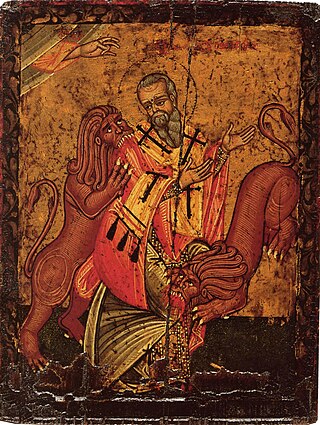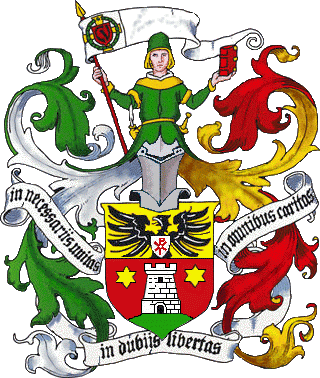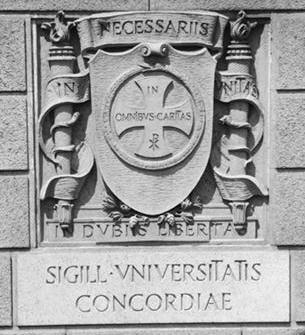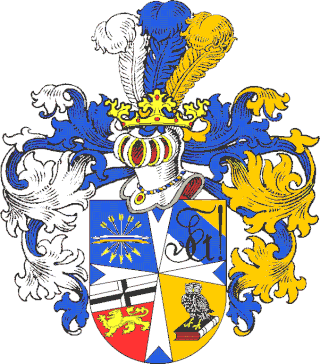
In necessariis unitas, in dubiis libertas, in omnibus caritas (lit. 'unity in necessaries; liberty in doubts; charity in all') is a Latin phrase.

In necessariis unitas, in dubiis libertas, in omnibus caritas (lit. 'unity in necessaries; liberty in doubts; charity in all') is a Latin phrase.
It is often misattributed to Augustine of Hippo, but seems to have been first used in 1617 by Archbishop of Split (Spalato) Marco Antonio de Dominis in his anti-Papal De Republica Ecclesiastica, [1] where it appears in context as follows (emphasis added):
Quod si in ipsa radice, hoc est sede, vel potius solio Romani pontificis haec abominationis lues purgaretur et ex communi ecclesiae consilio consensuque auferretur hic metus, depressa scilicet hac petra scandali ac ad normae canonicae iustitiam complanata, haberemus ecclesiae atrium aequabile levigatum ac pulcherrimis sanctuarii gemmis splendidissimum. Omnesque mutuam amplecteremur unitatem in necessariis, in non necessariis libertatem, in omnibus caritatem. Ita sentio, ita opto, ita plane spero, in eo qui est spes nostra et non confundemur. Ita sentio, ita opto, ita plane spero, in eo qui est spes nostrae et non confundemur. [2]
transl. But if at the very root, that is, the seat, or rather the throne of the Roman pontiff, this evil of abomination were purged, and by the common counsel and consent of the church, this fear was removed; most splendid. And let us all embrace one another, in necessary things unity; in uncertain things liberty; in all things charity. I feel so, I wish so, I hope so plainly, in him who is our hope and we shall not be disappointed. I feel so, I wish so, I hope so plainly, in him who is our hope and we shall not be disappointed.
Before the 21st century, academic consensus was that the source of the quotation was probably Lutheran theologian Peter Meiderlin (known as Rupertus Meldenius), who, in his Paraenesis votiva pro pace ecclesiae ad theologos Augustanae of 1626 had said, "Verbo dicam: Si nos servaremus in necessariis Unitatem, in non-necessariis Libertatem, in utrisque Charitatem, optimo certe loco essent res nostrae", meaning "In a word, let me say: if we might keep in necessary things Unity, in non-necessary things Freedom, and in both Charity, our affairs would certainly be in the best condition." Henk Nellen's 1999 article that showed the phrase had previously been used by De Dominis overturned over a century of academic consensus. [3]
According to Joseph Lecler, the substitution of dubiis for non necessariis (omnibus occurs here, rather than, as in Meiderlin, utrisque) was made in largely Catholic circles, and had the effect of extending "the rule of Meldenius... to much more than just the necessaria [(for salvation)] and the non necessaria [(for salvation)]", much more than just the "fundamental articles": "the tripartite maxim... [thus] lost its original Protestant nuance, in order to extend liberty to the entire domain of questions debated, doubtful, and undefined [(non définies par l'Église)]". [4]
The maxim has entered official Catholic teaching when Pope John XXIII's encyclical Ad Petri Cathedram of 29 June 1959 used it favorably. [5] In a section saying that sometimes religious controversies can actually help attain church unity, he says "But the common saying, expressed in various ways and attributed to various authors, must be recalled with approval: in essentials, unity; in doubtful matters, liberty; in all things, charity." [6]
In the United Methodist Church Book of Discipline, the phrase appears in the doctrinal history section as "In essentials, unity; in non-essentials, liberty; and in all things, charity." A few lines later, the mandate is emphasized as "the crucial matter in religion is steadfast love for God and neighbor, empowered by the redeeming and sanctifying work of the Holy Spirit." [7] : 57

The word catholic comes from the Greek phrase καθόλου 'on the whole, according to the whole, in general', and is a combination of the Greek words κατά 'about' and ὅλος 'whole'. The first known use of "Catholic" was by the church father Saint Ignatius of Antioch in his Letter to the Smyrnaeans. In the context of Christian ecclesiology, it has a rich history and several usages.

The National Grange, a.k.a. The Grange, officially named The National Grange of the Order of Patrons of Husbandry, is a social organization in the United States that encourages families to band together to promote the economic and political well-being of the community and agriculture. The Grange, founded after the Civil War in 1867, is the oldest American agricultural advocacy group with a national scope. The Grange actively lobbied state legislatures and Congress for political goals, such as the Granger Laws to lower rates charged by railroads, and rural free mail delivery by the Post Office.

Marco Antonio de Dominis was a Dalmatian ecclesiastic, archbishop of Split and Primate of Dalmatia and all Croatia, adjudged heretic of the Catholic faith, polymath and man of science.
Hendiatris is a figure of speech used for emphasis, in which three words are used to express one idea. The phrases "sun, sea and sand", and "wine, women and song" are examples.
The homeoptoton, is a figure of speech consisting in ending the last words of a distinct part of the speech with the same syllable or letter.

Unity in diversity is used as an expression of harmony and unity between dissimilar individuals or groups. It is a concept of "unity without uniformity and diversity without fragmentation" that shifts focus from unity based on a mere tolerance of physical, cultural, linguistic, social, religious, political, ideological and/or psychological differences towards a more complex unity based on an understanding that difference enriches human interactions. The idea and related phrase is very old and dates back to ancient times in both Western and Eastern Old World cultures. It has applications in many fields, including ecology, cosmology, philosophy, religion and politics.

Ferenc Dávid was a Protestant preacher and theologian from Transylvania, the founder of the Unitarian Church of Transylvania, and the leading figure of the Nontrinitarian Christian movements during the Protestant Reformation. He disputed the mainstream Christian doctrine of the Trinity, believing God to be one and indivisible.
The phrase "bell, book, and candle" refers to a Latin Christian method of excommunication by anathema, imposed on a person who had committed an exceptionally grievous sin. Evidently introduced by Pope Zachary around the middle of the 8th century, the rite was once used by the Latin Church.
Aggiornamento is an Italian word meaning "bringing up to date", "updating". It was made famous by Pope John XXIII, and was one of the key words at the Second Vatican Council, used by both bishops and the media.

The Union of Catholic German Student Fraternities is a German umbrella organization of Catholic male student fraternities (Studentenverbindung).
The Pontifical Commission Ecclesia Dei was a commission of the Catholic Church established by Pope John Paul II's motu proprioEcclesia Dei of 2 July 1988 for the care of those former followers of Archbishop Marcel Lefebvre who broke with him as a result of his consecration of four priests of his Society of St. Pius X as bishops on 30 June 1988, an act that the Holy See deemed illicit and a schismatic act. It was also tasked with trying to return to full communion with the Holy See those traditionalist Catholics who are in a state of separation, of whom the Society of Saint Pius X (SSPX) is foremost, and of helping to satisfy just aspirations of people unconnected with these groups who want to keep alive the pre-1970 Roman Rite liturgy.

Union University is a loose federation of Union College along with a number of graduate schools, founded in 1873 and located in the Albany metropolitan area of New York State.

The Hannover Medical School, founded in 1965, is a university medical centre in the city of Hanover, in Germany, part of a regional medical network.
This article covers the period from the origin of the Moravian Church, as well as the related Hussite Church and Unity of the Brethren, in the early fourteenth century to the beginning of mission work in 1732. Further expanding the article, attention will also be paid to the early Moravian settlement at Bethlehem, Pennsylvania, following their first arrival in Nazareth, Pennsylvania in 1740.

The Wissenschaftliche Katholische StudentenvereinUnitas Stolzenfels was established in 1910. It is a Catholic student fraternity at the University of Bonn in Germany. It is a member of the Unitas-Verband (UV) an umbrella organization of several Catholic fraternities and sororities. Unitas Stolzenfels is the second oldest of the four today existing Unitas associations in Bonn. Others are W.K.St.V. Unitas-Salia (1847), W.K.St.V. Unitas Rhenania (1912) and the sorority W.K.St.V. Unitas Clara-Schumann (1992).
The formulary controversy was a 17th- and 18th-century Jansenist refusal to confirm the Formula of Submission for the Jansenists on the part of a group of Catholic ecclesiastical personnel and teachers who did not accept the charge that their beliefs about the nature of man and grace were heretical as the Holy See declared. In the Kingdom of France, it pitted Jansenists against Jesuits. It gave rise to French theologian Blaise Pascal's Lettres provinciales, the condemnation of casuistry by the Holy See, and the dissolution of organised Jansenism.

Rupertus Meldenius, aka Peter Meiderlin and Peter Meuderlinus was a Lutheran theologian and educator. The son of a Swabian priest, he studied in Adelberg and after school visited the lower Konvikts in Maulbronn at the Tübinger Stift, where he met Johann Valentin Andreae. Meiderlin was a student of Mathias Haffenreffer and in 1601 obtained a master's degree. In 1605, he was at the Repentant convent in Tübingen. In 1607, he assumed the Chair of the deceased philologist Martin Crusius. After a post as senior deacon in Kirchheim unter Teck in 1612, he was "Ephorus" of the Evangelical College of St. Anna in Augsburg. He held this office, until 1650.
Separated brethren is a term sometimes used by the Catholic Church and its clergy and members to refer to baptized members of other Christian traditions. The phrase is a translation of the Latin phrase fratres seiuncti. It is largely used as a polite euphemism in contexts where the terms "formal heretics" or "material heretics" might cause offense.

Augustinianism is the philosophical and theological system of Augustine of Hippo and its subsequent development by other thinkers, notably Boethius, Anselm of Canterbury and Bonaventure. Among Augustine's most important works are The City of God, De doctrina Christiana, and Confessions.